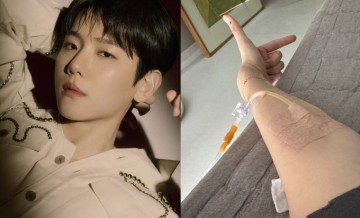Korean Classics: Kim Min Ki's 'Gijichon' Explores the Politics of Intimacy [AUDIO]
Intimacy can mean many things. Sex is only one definition, one shade along a complex spectrum. Intimacy can translate to privacy or proximity.
We all want intimacy, but by what means, and to what end? Whom we decide to share it with...well, that question itself only causes the mystery to bloom further.
In comparison to many of the early practitioners of K-pop, with their fondness for Phil Spector-style Wall of Sound grandiosity, Kim Min Ki's "Gijichon" achieves an intimacy that unfolds even as it maintains its withdrawn tranquility.
Kim's story is not well-known outside of the Korean peninsula. This is not a coincidence.
His name is synonymous with the "Norae Undong" (Song Movement) genre of protest folk that would grow popular with young people in the early 1980s.
However, Kim was an early precursor to this style, developing it a decade before it came into vogue among rebellious students. He voiced political opposition from his 1971 debut album onward, and refused to curb his beliefs.
Kim Min-ki was frequently arrested. His albums were incinerated. His music was officially banned for years. This cultural erasure can be felt to this day, not in his music's prominence, but in its absence.
There's not a great deal of Min-ki's music on YouTube. But "Gijichon" stands as a stark symbol of what the "Norae Undong" artists represented.
The most striking aspect of "Gijichon" settles into the listener's psyche as it plays out. Eschewing gimmicky reverb, this truly sounds like music being played in a room. This might even sound like a single take. That's a kind of intimacy.
The minor chords that unspool patiently bring to mind an unplugged "House of the Rising Sun."
Like that song, a foreboding anthem of unlucky times on the horizon, "Gijichon" is a version of the blues that transcends personal woes and suggests a cultural blues, a national blues.
The chords betray an awareness of jazz idioms, bringing to mind the early albums of Tom Waits, when that great American songwriter was still attempting to bridge jazz and folk music (and before he started stomping on scrap metal).
A little before the two-minute mark, Kim is joined by an unknown female voice.
The hushed closeness of their unison speaks of an escape. It speaks of a shared autonomy between two people. Folk music was used in the United States and elsewhere to suggest that same kind of closeness between the singers.
Kim's baritone is emotive without being melodramatic. A mental image of a smoldering cigarette on an ashtray and the performer, seated, eyes closed, is strongly evoked.
His stoicism stands in stark contrast to the sometimes cringeworthy earnestness worn by many of the US folk singers aiming for pop stardom in the 1960s.
Whatever topic he may be addressing on "Gijichon," Kim sounds unconcerned by the potential blowback.
The only contrast to the aloof smokiness is a soulful ad lib from the unnamed female vocalist about three minutes in. It's a scorching bit of relief, some flickering warmth to Kim's cold darkness.
Today, Kim Min Ki works as a film and theater director, finding other mediums through which to voice his political beliefs.
In 2007, the Goethe Institut of Germany awarded him a medal in honor of his social bravery. This reviewer hopes that others will eventually shine a light onto this man's unfairly dimmed career.
Check out the song "Gijichon" by Kim Min Ki RIGHT HERE
Jeff Tobias is a composer, multi-instrumentalist, and writer currently living in Brooklyn, New York. Most recently, he has been researching the history of tuning systems and working on his jump shot.
















